Daily Vocabulary Words: List of Daily Used Words in Leading International Newspapers
Hi there. Welcome to this special section @ Wordpandit.
Our endeavour here is very simple: to highlight important daily vocabulary words, which you would come across in leading newspapers in the country. We have included the following newspapers in our selection:
• The New York Times
• The Washington Post
• Scientific American
• BBC
• The Guardian
• Psychology Today
• Wall Street Journal
• The Economist
We are putting in extensive work for developing your vocabulary. All you have got to do is be regular with this section and check out this post on a daily basis. This is your repository of words that are commonly used and essentially, we are posting a list of daily used words. Hence, this has significant practical application as it teaches you words that are used commonly in leading publications mentioned above.
Visit the website daily to learn words from leading international newspapers.
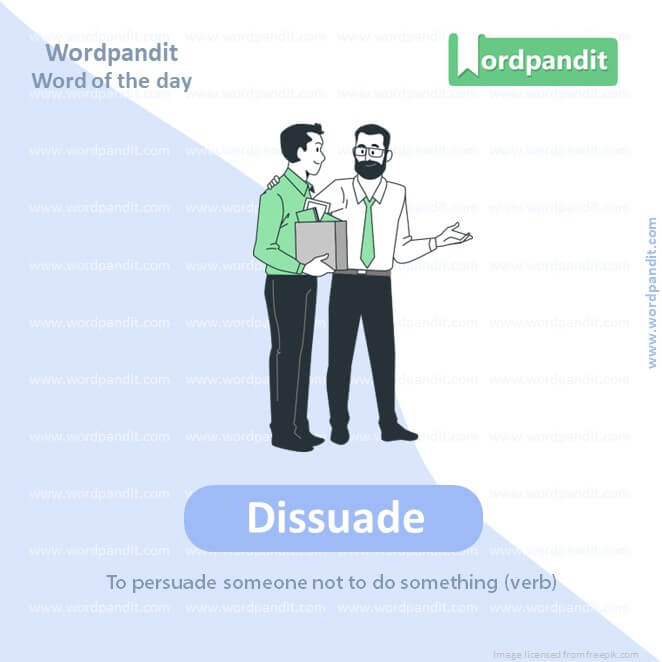
WORD-1: DISSUADE
CONTEXT: I know this won’t necessarily dissuade them from wiping us out, but you have to try to make it easier on yourself in any small way you can.
SOURCE: Guardian
EXPLANATORY PARAGRAPH: Imagine you really want to eat a lot of candy, but your friend tells you stories about toothaches and visits to the dentist. Your friend is trying to dissuade you from eating too much candy. That means they are trying to convince you not to do it because it might not be a good idea.
MEANING: To persuade someone not to do something (verb).
PRONUNCIATION: dis-SWAYD
SYNONYMS: Discourage, Deter, Prevent, Talk out of, Warn against
USAGE EXAMPLES:
1. My parents tried to dissuade me from going hiking alone.
2. The heavy rain might dissuade the team from playing outside.
3. The teacher dissuaded her from quitting the class.
4. Despite efforts to dissuade him, he decided to move abroad.
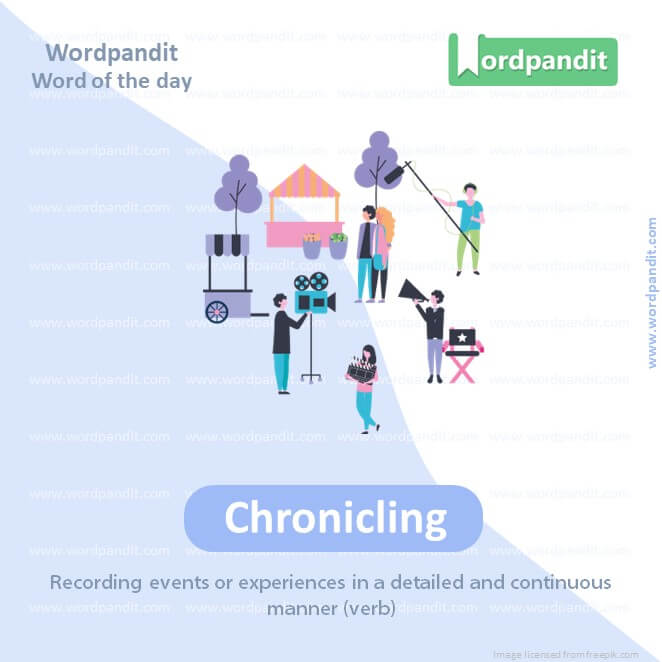
WORD-2: CHRONICLING
CONTEXT: This new crop of journalists joke that they landed their jobs by simply chronicling the attacks on their own homes.
SOURCE: Guardian
EXPLANATORY PARAGRAPH: Chronicling is like keeping a diary or a journal. When you write down what you did each day, the places you went, and the people you met, you are chronicling your life. It’s like telling the story of your life, one day at a time.
MEANING: Recording events or experiences in a detailed and continuous manner (verb).
PRONUNCIATION: KRON-i-kling
SYNONYMS: Recording, Documenting, Logging, Reporting, Narrating
USAGE EXAMPLES:
1. She enjoyed chronicling her travels in a blog.
2. The historian was chronicling the events of the war.
3. Chronicling daily activities became a part of his routine.
4. The documentary was a way of chronicling the community’s history.
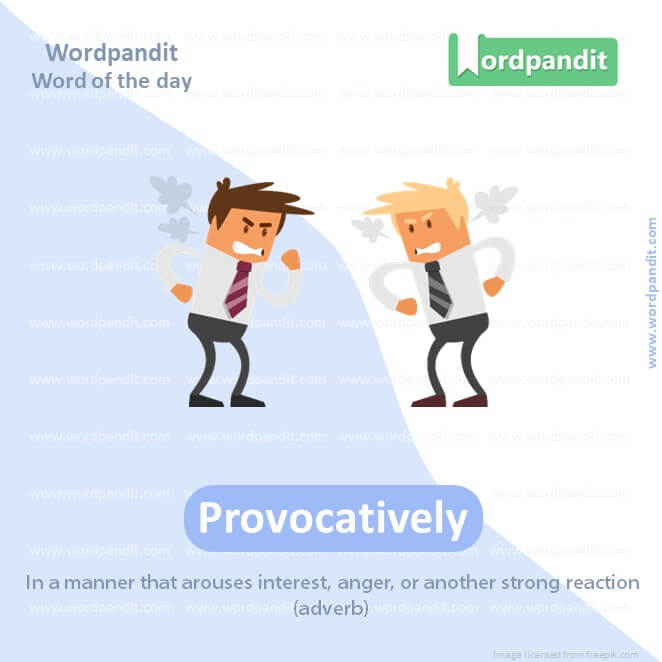
WORD-3: PROVOCATIVELY
CONTEXT: He asks, slightly provocatively: “Is it time to head south.”
SOURCE: Washington Post
EXPLANATORY PARAGRAPH: When someone acts or speaks provocatively, they do it in a way that might make others feel excited, angry, or upset. It’s like when someone teases you on purpose to get a reaction from you.
MEANING: In a manner that arouses interest, anger, or another strong reaction (adverb).
PRONUNCIATION: pruh-VOH-kuh-tiv-lee
SYNONYMS: Agitatingly, Stimulatingly, Excitingly, Inflamingly, Challengingly
USAGE EXAMPLES:
1. She spoke provocatively during the debate.
2. The article was written provocatively to grab attention.
3. He dressed provocatively for the fashion show.
4. The film’s subject was handled provocatively.
WORD-4: ANAESTHETIC
CONTEXT: News of the delay breaks her, as here in al-Shifa she is treated without anaesthetic.
SOURCE: Washington Post
EXPLANATORY PARAGRAPH: Anaesthetic is a special kind of medicine that doctors use to make sure you don’t feel pain during surgery. It’s like a magic sleep where you don’t feel anything when the doctor is fixing something in your body.
MEANING: A substance that causes loss of feeling or awareness, used to reduce pain (noun).
PRONUNCIATION: an-uh-STHET-ik
SYNONYMS: Painkiller, Numbing agent, Sedative, Analgesic, Narcotic
USAGE EXAMPLES:
1. The dentist used an anaesthetic before pulling out the tooth.
2. She was given an anaesthetic before her surgery.
3. Local anaesthetic was applied to the area to be stitched.
4. The anaesthetic wore off a few hours after the procedure.
WORD-5: EMBODIMENT
CONTEXT: Holocaust-guilt complexes cause them to fetishise Jewishness to the point of obsessive-compulsive embodiment.
SOURCE: Washington Post
EXPLANATORY PARAGRAPH: Embodiment is like being the perfect example of something. If your friend is always kind and helps everyone, you might say they are the embodiment of kindness, meaning they show exactly what kindness is.
MEANING: A tangible or visible form of an idea, quality, or feeling (noun).
PRONUNCIATION: em-BOD-ee-ment
SYNONYMS: Personification, Epitome, Incarnation, Manifestation, Example
USAGE EXAMPLES:
1. She is the embodiment of patience.
2. The statue was an embodiment of the city’s spirit.
3. His work is the embodiment of creativity.
4. The new policy is an embodiment of the government’s commitment.
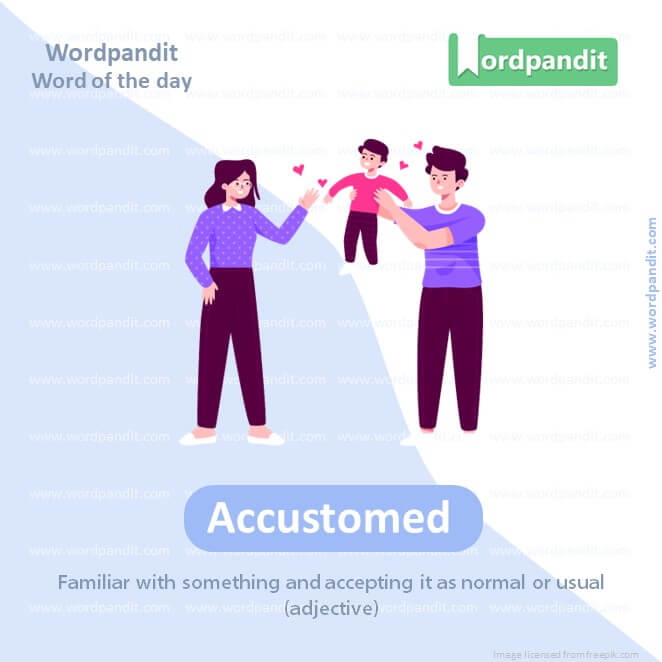
WORD-6: ACCUSTOMED
CONTEXT: I am accustomed to the aggression directed toward us by the powerful state-backed entity of official Judais.
SOURCE: Washington Post
EXPLANATORY PARAGRAPH: When you are accustomed to something, it means you are used to it. Like how you are accustomed to brushing your teeth every morning. It’s something you do regularly and feel comfortable with.
MEANING: Familiar with something and accepting it as normal or usual (adjective).
PRONUNCIATION: uh-KUSS-tumd
SYNONYMS: Used to, Familiar with, Habituated, Inured, Adapted
USAGE EXAMPLES:
1. She quickly became accustomed to the new environment.
2. He is accustomed to waking up early for work.
3. The travelers became accustomed to life on the road.
4. I’m not accustomed to such cold weather.
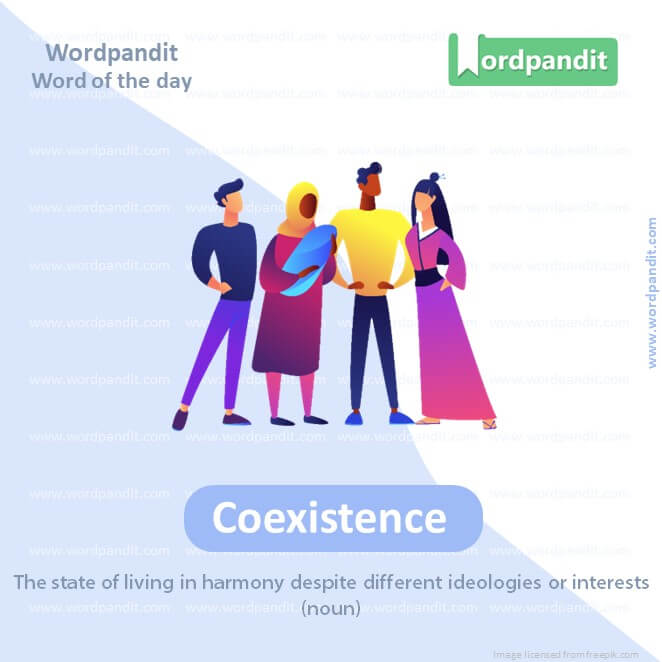
WORD-7: COEXISTENCE
CONTEXT: the left-leaning, secular segment of Israeli society; many of them were activists for peaceful coexistence.
SOURCE: Guardian
EXPLANATORY PARAGRAPH: Coexistence is when different people or things are together in the same place and get along well. It’s like different kinds of fish living together peacefully in the same aquarium.
MEANING: The state of living in harmony despite different ideologies or interests (noun).
PRONUNCIATION: koh-ig-ZIST-uhns
SYNONYMS: Harmony, Peaceful living, Symbiosis, Mutualism, Living together
USAGE EXAMPLES:
1. The park was a model of coexistence for different species.
2. They promoted coexistence between the two communities.
3. Coexistence of various cultures enriches the city.
4. The conference focused on peaceful coexistence.
WORD-8: ANTISEMITISM
CONTEXT: abeck recorded a statesman-like video on antisemitism.
SOURCE: Guardian
EXPLANATORY PARAGRAPH: Antisemitism is when people are unkind or unfair to Jewish people just because they are Jewish. It’s not nice to treat someone badly because of their religion or where they come from.
MEANING: Hostility, prejudice, or discrimination against Jews (noun).
PRONUNCIATION: an-ti-SEM-i-tiz-um
SYNONYMS: Prejudice against Jews, Jewish discrimination, Racism towards Jews, Hatred of Jews, Bigotry against Jews
USAGE EXAMPLES:
1. The museum had an exhibit on the history of antisemitism.
2. The community took a stand against antisemitism.
3. Laws were introduced to combat antisemitism.
4. The speaker was known for his views on antisemitism.
WORD-9: BLATANT
CONTEXT: frustration at the blatant hypocrisy used to silence critical voices; and yes, my disappointment in Habeck himself.
SOURCE: Guardian
EXPLANATORY PARAGRAPH: When something is blatant, it’s very obvious and not hidden at all. It’s like someone yelling loudly in a quiet library. Everyone can see or hear it easily.
MEANING: Done openly and unashamedly, clearly obvious (adjective).
PRONUNCIATION: BLAY-tuhnt
SYNONYMS: Obvious, Flagrant, Conspicuous, Undeniable, Evident
USAGE EXAMPLES:
1. The mistake in the report was blatant.
2. He told a blatant lie to his teacher.
3. The blatant disregard for the rules was shocking.
4. Her talent for music was blatant.
WORD-10: DELEGITIMISING
CONTEXT: that simply by applying our values conditionally we were already delegitimising them.
SOURCE: Washington Post
EXPLANATORY PARAGRAPH: Delegitimising is like saying something or someone is not important or not right. If someone built a sandcastle and another person said it’s not a real castle, they are delegitimising the sandcastle.
MEANING: Making something seem not valid or not acceptable (verb).
PRONUNCIATION: dee-li-JIT-uh-myz-ing
SYNONYMS: Discrediting, Undermining, Invalidating, Denouncing, Disparaging
USAGE EXAMPLES:
1. The article was seen as delegitimising the government’s efforts.
2. They were accused of delegitimising the election results.
3. The campaign aimed at delegitimising the opposing viewpoint.
4. His comments were viewed as delegitimising the achievements of the team.
vocabulary games for adults
Learning new words and expanding one’s lexical range should not be confined to the four walls of a classroom nor should it be deemed an activity exclusively meant for children. Yes, we’re talking about ‘vocabulary games for adults,’ a fun and interactive way to intensify language skills and broaden intellectual horizons.
Often, people associate the term ‘vocabulary games for adults’ with something overwhelming or tedious. However, its essence is quite the opposite: to transform the otherwise mundane process of vocabulary augmentation into an engaging, enjoyable experience. Such games enable adults to step out of their comfort zone, explore the vast world of words, and become more articulate and proficient in communication.
Vocabulary games for adults are ideally designed to challenge the mind and stimulate curiosity. Rather than the constant flipping of flashcards or poring through dictionaries, these games incorporate a playful element, ensuring the learning experience is not just effective but also entertaining. They help in retaining new words better and applying them more fluidly in everyday conversation.
Ranging from online crossword puzzles, word searches to mobile applications, there are umpteen vocabulary games for adults available at the tips of your fingers, seamlessly merging learning with leisure. Not forgetting the traditional Scrabble or Boggle which not only test players’ vocabulary but also their strategic abilities.
But how should vocabulary games for adults be learned and incorporated into daily life? The key here is not to complicate it. Committing to fifteen or twenty minutes of gameplay a day, perhaps during your commute or break time, can lead to significant improvement over time. Remember, it’s not about winning; it’s about progressively expanding your diction.
In conclusion, vocabulary games for adults are not only an excellent tool for wordsmiths but also for those seeking to reinforce their linguistic competence or simply with the desire to learn. So why wait? Add a fun twist to your daily routine with vocabulary games for adults and become a wordsmith yourself!










